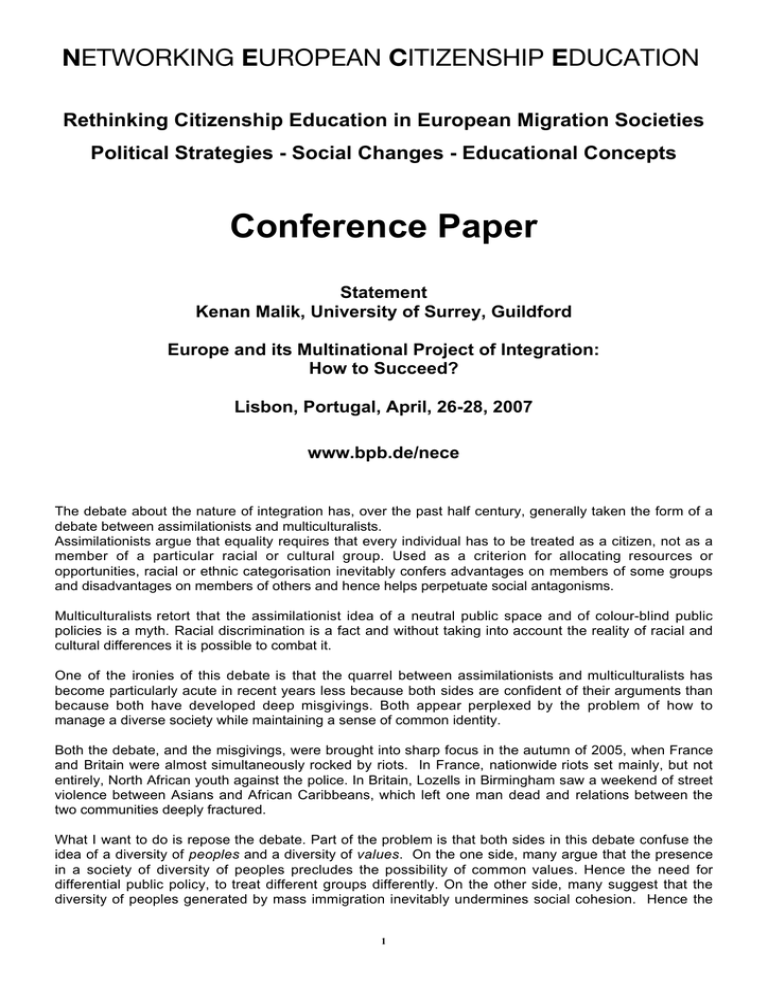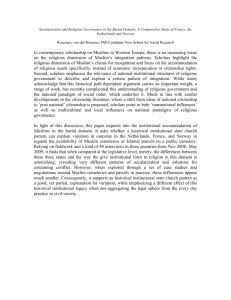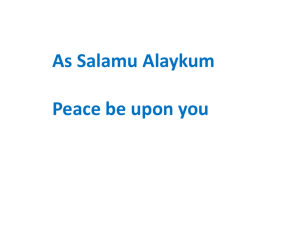N
advertisement

NETWORKING EUROPEAN CITIZENSHIP EDUCATION Rethinking Citizenship Education in European Migration Societies Political Strategies - Social Changes - Educational Concepts Conference Paper Statement Kenan Malik, University of Surrey, Guildford Europe and its Multinational Project of Integration: How to Succeed? Lisbon, Portugal, April, 26-28, 2007 www.bpb.de/nece The debate about the nature of integration has, over the past half century, generally taken the form of a debate between assimilationists and multiculturalists. Assimilationists argue that equality requires that every individual has to be treated as a citizen, not as a member of a particular racial or cultural group. Used as a criterion for allocating resources or opportunities, racial or ethnic categorisation inevitably confers advantages on members of some groups and disadvantages on members of others and hence helps perpetuate social antagonisms. Multiculturalists retort that the assimilationist idea of a neutral public space and of colour-blind public policies is a myth. Racial discrimination is a fact and without taking into account the reality of racial and cultural differences it is possible to combat it. One of the ironies of this debate is that the quarrel between assimilationists and multiculturalists has become particularly acute in recent years less because both sides are confident of their arguments than because both have developed deep misgivings. Both appear perplexed by the problem of how to manage a diverse society while maintaining a sense of common identity. Both the debate, and the misgivings, were brought into sharp focus in the autumn of 2005, when France and Britain were almost simultaneously rocked by riots. In France, nationwide riots set mainly, but not entirely, North African youth against the police. In Britain, Lozells in Birmingham saw a weekend of street violence between Asians and African Caribbeans, which left one man dead and relations between the two communities deeply fractured. What I want to do is repose the debate. Part of the problem is that both sides in this debate confuse the idea of a diversity of peoples and a diversity of values. On the one side, many argue that the presence in a society of diversity of peoples precludes the possibility of common values. Hence the need for differential public policy, to treat different groups differently. On the other side, many suggest that the diversity of peoples generated by mass immigration inevitably undermines social cohesion. Hence the 1 NETWORKING EUROPEAN CITIZENSHIP EDUCATION need to clamp down on immigration and to reduce the level of diversity. Both arguments are wrong. It is facile to suggest that society can run on diversity alone. Every society needs a common set of values to function properly, a vision of what kind of society it is. Of course, in every society values are contested, and there are radically different visions of the ideal society. Such conflict is not new, nor the product of immigration. Conflict between different value systems is part of a healthy democratic process necessary to mould the political and cultural shape of a society. What doesn’t work is a laissez-faire attitude to values, whereby values are deemed to be incommensurate and a society is defined simply in terms of its willingness to tolerate differences. It is equally facile to try to pin the blame for the erosion of common values on immigrants. Take for instance the common fear that Islamic values are incompatible with the tenets of liberal democracy and that the growth of the Muslim community will undermine cohesion and transform basic secular values. The trouble is there is no such thing as the Muslim community nor a single set of Islamic values. Muslim communities are as riven by difference and division as any other community – especially divisions of class, gender and nationality. Today ‘radical’ in the Islamic context means religiously fundamentalist. When I was growing up in the 1980s it meant the very opposite – to be radical in Muslim communities was to be secular. Today the idea of a secular Muslim seems almost an oxymoron, but twenty years ago there were very strong and vibrant secular movements and organisations. The fact that they have disappeared and the Muslim community has come to be defined largely in religious terms, and its values defined largely in opposition to western liberal values, is not something intrinsic to Islam or to Muslim communities, but a product of both social developments and public policy that have shaped the character of those communities. The real problem is not so much that immigrants can’t imbibe the values of liberal democracy, but that within many Western nations the sense of what those values are have been eroded, as has the sense of what kind of society they are or want to be. As a result people have begun to view themselves and their social affiliations in a different way. Social solidarity has become increasingly defined not in political terms - as collective action in pursuit of certain political ideals – but in terms of ethnicity, culture or faith. The question people ask themselves is not so much ‘What kind of society do I want to live in?’ as ‘Who are we?’. The first question looks forward for answers and defines them in terms of the commonality of values necessary for establishing the good life. The second one generally looks back and seeks answers – and defines identity – in terms of history and heritage. The politics of ideology, in other words, has given way to the politics of identity. One of the enduring myths about immigration and integration is that the political classes have acquiesced to multicultural policies because minority groups have demanded that their cultural differences be recognised and be afforded respect. This is not the case, even in Britain where such policies have been taken furthest in Europe. Historically, postwar immigrants, including Muslims, were concerned less with preserving their cultural differences than in achieving political equality. Certainly, there was alienation and anger because of the degree of racism encountered. But the goal was always to gain equal political rights. Only over the past two decades have immigrant groups sought to assert their cultural difference. Why? Because they have been encouraged to do so by societies that celebrate the idea that different communities should pursue their own cultural values and interests. Immigration, in other words, has not caused the fraying of a common set of values. Rather multiculturalism is itself the product of such frayed values. Multiculturalism was the official response to the identity crisis within Western societies, an attempt to provide a positive sheen to this crisis, representing the lack of common identity as a new cultural pluralism, and the fragmentation of communities as an enriching kind of diversity. Accompanying this confusion between the idea of a diversity of peoples and a diversity of values is 2 NETWORKING EUROPEAN CITIZENSHIP EDUCATION another confusion: between diversity as lived experience and multiculturalism as a political process. As lived experience, diversity is positive. Thanks to mass immigration Western Europe is less insular, less homogenous, more vibrant and cosmopolitan than it was half a century ago, and this is much better for it. Those who advocate multiculturalism as a political process are, however, talking about something different. Multiculturalism, they argue, requires the public recognition and affirmation of cultural differences. An individual’s cultural background frames their identity and helps define who they are. If we want to treat individuals with dignity and respect we must also treat with dignity and respect the groups who furnish them with their sense of personal being. Social justice, they argue, requires not just that individuals are treated as political equals, but that their cultural beliefs are also treated as equally valid; that different cultural beliefs are affirmed, recognised, and indeed institutionalised, in the public sphere. Ironically, the impact of multicultural policies has been to undermine diversity as lived experience. As lived experience, diversity is an argument for open borders and open minds. The consequences of multiculturalism as a political project is, however, to seal people into ethnic boxes and to police the boundaries. A good illustration of this came in a public argument broke out last year in Britain between Tony Blair and Britain's Muslim leaders about the lack of progress in combating home-grown terrorism. Muslims accused the government of ignoring their advice about how best to deal with extremists. The real problem, the prime minister responded, was that moderate Muslims had not done enough to root out extremists within their own communities. The starting point for both sides was the belief that Muslims constitute a community with a distinct set of views and beliefs, and that mainstream politicians are incapable of reaching out to them. So there had to be a bargain between the government and the Muslim community. The government acknowledged Muslim leaders as crucial partners in the task of defeating terrorism and building a fairer society. In return, Muslim leaders agreed to keep their own house in order. The argument was about who was, or was not, keeping their side of the bargain. The trouble is, the bargain itself is the problem. For what it shows is that the government abandoned its responsibility for engaging directly with its citizens who happen to be Muslim. Instead, it has effectively subcontracted its responsibilities to so-called community leaders. Rather than appealing to Muslims as British citizens, and attempting to draw them into the mainstream political process, today politicians of all hues prefer to see them as people whose primarily loyalty is to their faith and who can be politically engaged only by other Muslims. The consequences of this approach are hugely damaging. ‘Why', as Amartya Sen asked in his book Identity and Violence, ‘should a British citizen who happens to be Muslim have to rely on clerics and other leaders of the religious community to communicate with the prime minister of the country?’ Far from promoting any sense of integration, such multicultural policies encourages Muslims – and other minorities - to see themselves as semi-detached Britons. After all, is it surprising that if mainstream politicians abdicate their responsibility for engaging with ordinary Muslims, that those Muslims should feel disenchanted with the mainstream political process? But the insistence that individuals everyone as citizens, not as bearers of specific racial or cultural histories, that they should not be treated differently because of their racial and cultural identities does not mean that discrimination against particular groups should be ignored. We should not confuse ‘colour blindness’ and ‘racism blindness’. This is exactly what is happening in France. Assimilationism in France has come to mean not ignoring differences, but pointing up differences to suggest why certain groups – in particular Muslims - cannot be French. The policy of corralling hundreds of thousands of the poor and disadvantaged into sink estates, 3 NETWORKING EUROPEAN CITIZENSHIP EDUCATION exposing them to unemployment rates of up to 40 per cent and subjecting them to daily discrimination at the hands of employers and the police is not designed to produce liberté, égalité et fraternité. Citizenship has no meaning, if different classes of citizens are treated differently, whether through multicultural policies or through racism. What we really need to do is to separate our attitudes to the public and the private spheres. The private sphere is inherently unequal. Political equality only becomes possible with the creation of a ring-fenced public sphere, which everyone can enter as political equals, whatever their cultural, economic or ethnic backgrounds. Both multiculturalists and assimilationists seek to erase the distinction, on the one hand by demanding public recognition of cultural differences, on the other by insisting that the state step in to impose cultural norms on immigrants – such as, for instance, banning the wearing of the veil. In so doing, they make equality impossible. Only by establishing a distinction between the public and the private can we forge a relationship between diversity and equality, allowing citizens to have full freedom to pursue their different values or practices in private, while ensuring that in the public sphere all citizens are treated as political equals whatever the differences in their private lives. 4






